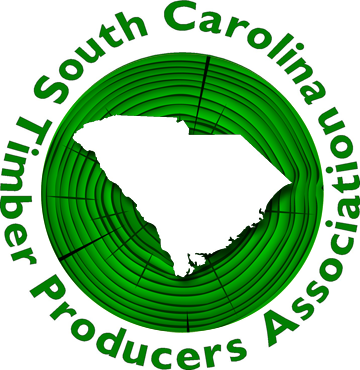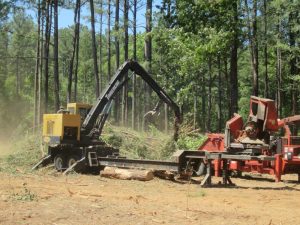Accomplishments
SCTPA was instrumental in the passage of the New Increased GVW 15% Tolerance for trucking unprocessed forest pr products increasing GVW to 84,272 pounds on Non-Interstate Highways Only (Not On Interstates) coupled with the New Strobe Light Law for longwood loads for improved highway safety. Both laws were effective May 21, 2008. This additional 3,664 pounds or 1.832 tons has helped loggers and truckers generate more income.
Because SCTPA worked with State Transport Police (STP) to revise our SC Intrastate Un- manufactured Forest Products (UFP) Trucking Regulations effective January 1, 2007, certain variations and exemptions were retained that STP wanted removed. Likewise, because we negotiated with STP not all the proposed federal regulations were included which would have surely encumbered the trucking of UFP products within our state. Loggers and Truck- ers would have been hammered with far more regulations than needed.
Working to resolve the issue where IR S removed the 25% reduction for log trucks in the Heavy Vehicle Use Tax and is auditing SC loggers to recover the taxes. NOW loggers are able to file for a refund if they were audited and had to pay taxes. SCTPA has formed a coalition with American Loggers Council, FRA, and the NC and VA loggers associations to resolve this issue first in SC and then in the other two states.
First to tackle the SCDOT postings of H-10 bridges in October 2008 due to the new 15% GVW tolerance. Met with SCDOT to arrange a compromise regarding the posting of H-10 bridges so that SCDOT will attempt to get potential and posted H-10 bridges back to an accessible level. Helped SC DOT put H-10 Postings on their website by county.
Because SCTPA worked within the framework of the statewide trucking committee that worked with the SC Senate Transportation Subcommittee, State Transport Police and SC Department of Public Safety, the New Size, Weight and Safety Fine System effective Octo- ber 1, 2006 still allows Unmanufactured Forest Products trucking to retain the 50% reduction of the over gross citation up to 6,000 lbs. overweight. Additionally, the new system is more reasonable than the initial proposed system by STP and DPS. SCTPA represented and worked for our members and the industry. Without SCTPA at the table, loggers and UFP truckers would have been paying the full fine just like regular trucking. Again, Loggers and UFP truckers would have been hammered!
Represents the timber harvesting, timber supply and unmanufactured forest products trucking segments in the SC General Assembly and in Washington, DC. Visits Washington, DC annually to meet with SC House and Senate members for federal legislation impacting timber harvesting, trucking and sustainable forestry.
Solely responsible for enacting the Variance to the OSHA CPR/First Aid Standard to allow loggers to have two workers certified in CPR/ First Aid at each active landing and allow those certified to train other workers. Not all workers have to be certified now, which saves money and logistics problems for training.
SCTPA and District Members work within their counties to avoid unnecessary ordinances that would restrict timber harvesting and timber transportation. Prevented Newberry, Greenville and Aiken Counties from enacting prohibitive ordinances regarding UFP Trucks using county gravel and dirt roads.
SCTPA worked with the town of St. Matthews to negotiate an alternative route around town rather than having log trucks routed over twenty-five miles out of the way.
Worked with individual counties such as Horry and Greenville Counties in 2008 in stopping local ordinances that would have restricted sustainable forestry and timber harvesting.
Prevented Lexington County from enacting a permitting process for loggers.
Intervened in a logging job protest in Spartanburg County and handled the television and print media relations to promote sustainable forestry and professional logging practices.
Supports the American Loggers Council position of allowing state-approved GVW’s on federal interstate highway systems within that state. Working with coalitions to increase GVW’s on federal interstate systems.
Worked with Greenville County in October r 2008 to stop the county from removing the exemption for forest and logging roads under the Stormwater Runoff Regulations.
Testified and stopped Lancaster County Council from enacting an ordinance prohibiting tractor-trailer units from being parked on private property zoned agriculture.
SCTPA worked with State Transport Police to agree that STP would not set up and weigh at mills on consecutive days, for prolonged periods of time and that trucks would not be held up while sitting in line to enter a wood receiving facility.
Working with SC Department of Revenue to stop counties from attempting to collect Property Taxes on logging equipment, which is exempt under a previous ruling, via an official statement being issued by SCDOR.
Supported and worked to pass the SC Right To Forestry Law (Passed May 2009) exempting forest landowners, sustainable forestry practices and timber harvesting from county and municipal tree ordinances.
Member of the SC Biomass Council and the Western Piedmont Biomass Marketing Committee for the development of woody biomass utilization and alternative markets for wood and woody biomass in SC.
Involved in Woody Biomass Utilization projects around the state for locating wood and woody biomass alternative markets.
Worked to revise and pass important Timb er Theft and Timber Fraud Laws that would not harm innocent loggers via allegations without investigative proof of wrongdoing.
Worked to stop the IRS from eliminating the Mobile Machinery Exemption for Logging Equipment from federal excise and federal highway use taxes.
Represents Unmanufactured Forest Products Trucking on the Statewide Trucking Task Force to improve SCDMV services to trucking.
Helped return a refund to a logger member that was denied by SCDMV initially when the logger changed vehicle tags to apportioned tags from regular in-state tags.
Instrumental in forming the SC Timber Harvesting Subcluster to develop recommendations for wood supply system improvements. This resulted in the new law for the 15% GVW Weight Tolerance for Unmanufactured Forest Product Trucking.
SCTPA was instrumental in implementing the Timber Harvesting Heavy Equipment Operators Certificate Program at Horry-Georgetown Technical College’s Georgetown campus to train qualified operators for improved labor to join our industry
Now that program has been reorganized and incorporated into another logger training and forestry program. SCTPA worked to include a Log Truck Drivers Training Program into the Glasscock CDL Driver Training Institute in Sumter.
SCTPA is a charter member of the Wood Supply Research Institute bringing together logger associations, wood receiving companies, wood suppliers and landowners to fund wood supply chain research projects for improvements in wood supply, trucking, logging, wood yard and economic efficiencies.
Charter member of the American Loggers Council. ALC is our national voice for professional loggers.

